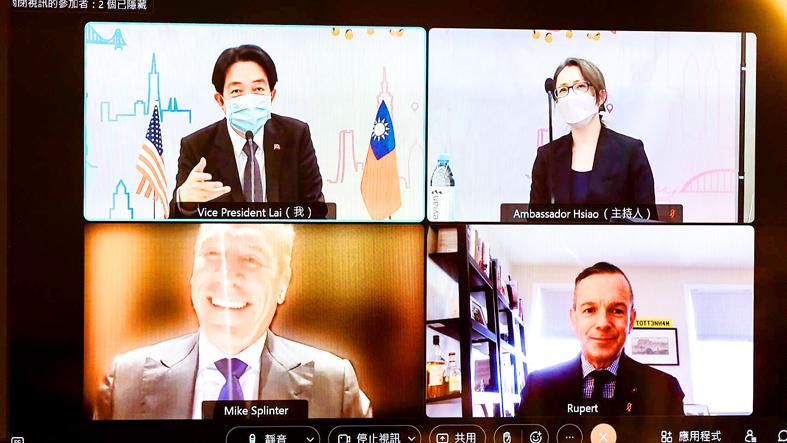Vice President William Lai (賴清德) on Saturday spoke with US Senator Tammy Duckworth by telephone and met with US experts virtually in San Francisco as he wrapped up his trip to the US and Honduras.
Lai and his delegation left San Francisco to return to Taiwan on Saturday afternoon, ending a trip that included a visit to Los Angeles for about 24 hours and to Honduras for nearly two days, to attend the inauguration of Honduran President Xiomara Castro.
In his 20-minute talk with Duckworth, Lai thanked her for her support of Taiwan and help in obtaining COVID-19 vaccines, Representative to the US Hsiao Bi-khim (蕭美琴) said.

Photo: CNA
They also discussed potential areas of cooperation for the countries, while Duckworth said that the US would not let Taiwan stand alone and expressed an interest in visiting the nation again, Hsiao said.
Duckworth, a supporter of Taiwan in the US Senate, briefly visited the nation in June last year, when she announced that the US would provide COVID-19 vaccines to Taiwan, as it struggled to obtain vaccines it had ordered.
Earlier on Saturday, Lai held virtual talks with several US experts and former officials on a range of issues.
He spoke with Yvonne Maldonado, a professor of pediatrics and health research, and Jason Wang (王智弘), a public health expert, both at Stanford University, about the spread of the Omicron variant of SARS-CoV-2 and epidemic prevention, Hsiao said.
Lai also met virtually with US-Taiwan Business Council chairman Michael Splinter and president Rupert Hammond-Chambers.
They discussed the potential for bilateral trade talks under the Trade and Investment Framework Agreement, and the hope that a Taiwan-US trade agreement could be negotiated, Hsiao said.
In another videoconference, Lai met with former US national security adviser H.R. McMaster, former deputy national security adviser Matthew Pottinger and Matt Turpin, an expert on US policy toward China at the Hoover Institution.
They discussed security issues, such as how Taiwan could enhance stability across the Taiwan Strait, and strengthen cooperation with the US and its allies to reduce its dependence on China, Hsiao said.
Lai expressed to them his confidence in Taiwan, and talked about how the nation plans to enhance its economy and make itself an indispensable part of the global supply chain, Hsiao said.
Lai’s delegation arrived in San Francisco on Friday, when he held virtual talks with the overseas Taiwanese community and US House of Representatives Speaker Nancy Pelosi.

ACTION PLAN: Taiwan would expand procurement from the US and encourage more companies to invest in the US to deepen bilateral cooperation, Lai said The government would not impose reciprocal tariffs in retaliation against US levies, President William Lai (賴清德) said yesterday, as he announced five strategies to address the issue, including pledging to increase Taiwanese companies’ investments in the US. Lai has in the past few days met with administrative and national security officials, as well as representatives from various industries, to explore countermeasures after US President Donald Trump on Wednesday last week announced a 32 percent duty on Taiwanese imports. In a video released yesterday evening, Lai said that Taiwan would not retaliate against the US with higher tariffs and Taiwanese companies’ commitments to

Intelligence agents have recorded 510,000 instances of “controversial information” being spread online by the Chinese Communist Party (CCP) so far this year, the National Security Bureau (NSB) said in a report yesterday, as it warned of artificial intelligence (AI) being employed to generate destabilizing misinformation. The bureau submitted a written report to the Legislative Yuan in preparation for National Security Bureau Director-General Tsai Ming-yen’s (蔡明彥) appearance before the Foreign Affairs and National Defense Committee today. The CCP has been using cognitive warfare to divide Taiwanese society by commenting on controversial issues such as Taiwan Semiconductor Manufacturing Co’s (TSMC, 台積電) investments in the

HELPING HAND: The steering committee of the National Stabilization Fund is expected to hold a meeting to discuss how and when to utilize the fund to help buffer the sell-off The TAIEX plunged 2,065.87 points, or 9.7 percent, to close at 19,232.35 yesterday, the highest single-day percentage loss on record, as investors braced for US President Donald Trump’s tariffs after an extended holiday weekend. Amid the pessimistic atmosphere, 945 listed companies led by large-cap stocks — including Taiwan Semiconductor Manufacturing Co (TSMC, 台積電), Hon Hai Precision Industry Co (鴻海精密) and Largan Precision Co (大立光) — fell by the daily maximum of 10 percent at the close, Taiwan Stock Exchange data showed. The number of listed companies ending limit-down set a new record, the exchange said. The TAIEX plunged by daily maxiumu in just

‘COMPREHENSIVE PLAN’: Lin Chia-lung said that the government was ready to talk about a variety of issues, including investment in and purchases from the US The National Stabilization Fund (NSF) yesterday announced that it would step in to staunch stock market losses for the ninth time in the nation’s history. An NSF board meeting, originally scheduled for Monday next week, was moved to yesterday after stocks plummeted in the wake of US President Donald Trump’s announcement of 32 percent tariffs on Taiwan on Wednesday last week. Board members voted to support the stock market with the NT$500 billion (US$15.15 billion) fund, with injections of funds to begin as soon as today. The NSF in 2000 injected NT$120 billion to stabilize stocks, the most ever. The lowest amount it